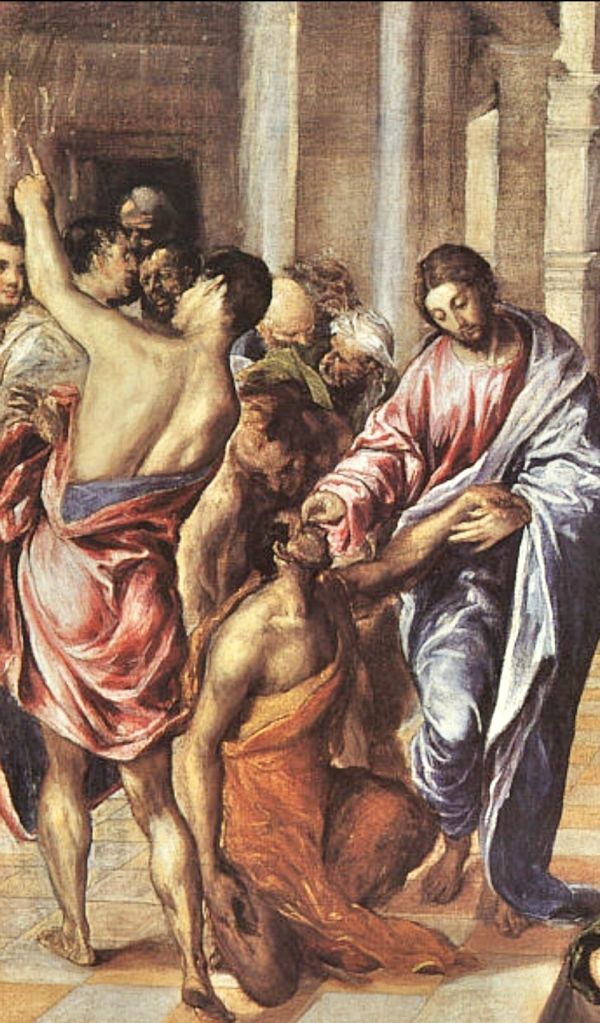(Mk 8:22-26)
In this section of Mk the initiation of Faith is described; in filigree, the routing to the relationship with Christ that takes away the difficulties of ‘sight’ - and the first baptismal liturgies typical rhythm.
The overall context of the passage makes it clear that the episode preludes a lengthy Jesus instruction.
He announces his Passion three times to Peter and disciples, who are reluctant to commit themselves to Cross.
When Mk was writing, the communities situation was one of deep travail. A lot of pains were experienced: it was not easy to understand so much suffering.
In 64 Nero decreed the first great persecution, which produced many victims among believers.
The following year the Jewish revolt broke out, triggering the bloody reconquest of Palestine starting from Galilee.
In the meantime, in Rome the troubles of the bloody civil war (68-69) were crumbling the idea of the Golden Age and rather causing a lot of hardships.
The holy city, Jerusalem, was being razed to the ground in 70. And although Titus had returned to Rome, the war was going on in other outbreaks, until the fall of Masada (74).
In this framework, strong tensions arose outside Palestine between Jewish converts to Christ and observant Jews; and the greatest difficulty was over the interpretation of Jesus’ Cross.
For the traditionalists - and at first for the apostles themselves - a defeated and humiliated man could not be the expected Messiah.
The Torah itself stated that all the crucified were to be considered persons cursed by God [Dt 21:22-23: «the hanged man is a curse from God»].
In that very context, Mk seems to hint that... the real blind ones are Peter and the apostles themselves, conditioned by the propaganda of the Messiah glorious King; as well as the Judaizers.
Everyone wanted a triumphant Jesus. They were like blind people who understood nothing but the easy and flashy propaganda - as well as the world organized on the basis of selfishness.
In order to heal the blindness of his leaders or simple community members who were still uncertain, the Lord had to lead them «out of the village» - the place of usual, ancient illusory beliefs.
And he had to forbid his intimates to re-enter it: there, no one would ever be able to understand the value of the self-giving in ordinary existence or in assembly living, God’s testimonies (vv.23.26).
The same happened to us, like as the «blind man from Bethsaida»: only when the Relationship was internalized and consolidated, did we move from glimmers to greater clarity, learning to understand people, issues, realities.
To be finally «enlightened», we had to accept that God’s gift was introduced through the identity of life in the Son.
The Lord healed our gaze, making us grow over time. A "portent" that became recovery, also natural.
A perspective that prompted decision and action, which now even measure up to great things. Starting from a new vantage point, filled with Hope.
This is also true in the perception of discomforts, which gradually regenerate the being - because anxieties are simple voices of an energy that wants to dispel fog and ballast, and make us flourish otherwise.
These are the event-witnesses to the ‘coming’ of the Messiah in our lives.
Intimate guiding events and images, which the Gospels do not frame in a Christological or ecclesiological framework of a triumphalist kind, but rather in an almost day-to-day and spontaneous manner; very human and relational.
To say that the new person is perhaps still immersed in the shadows, but gradually places the “old man” in the background.
And in the metamorphosis of perspective gaze, in Christ each can bring his or her future person closer.
[Wednesday 6th wk. in O.T. February 19, 2025]












